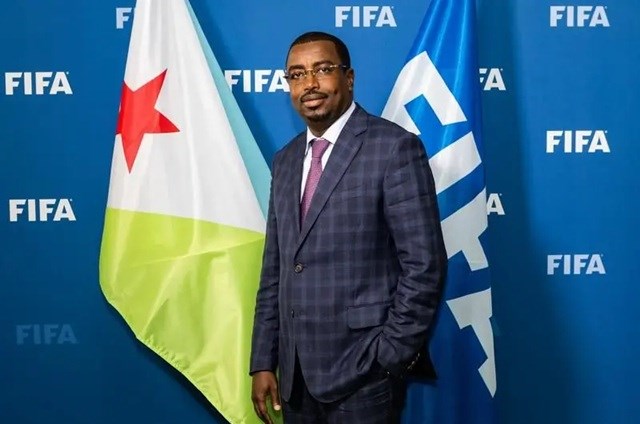
Thursday March 13, 2025

Djibouti’s Sulayman Waaberi poses after his historic election to FIFA’s Executive Committee, becoming the first East African to secure a seat on the global football governing body's highest decision-making panel. (Credit: FIFA)
Djibouti City (HOL) — For the first time in history, an East African representative has secured a seat on FIFA’s Executive Committee. Djibouti’s Sulayman Hassan Waaberi was elected in Cairo, joining football’s highest decision-making body, a momentous step for a region long on the periphery of the global game.
Waaberi’s four-year term on FIFA’s Executive Committee represents an opportunity for East Africa to influence global football policy for the first time.
His election was part of FIFA’s ongoing push for continental representation, with Africa securing six seats—five for men and one for a woman. Ten nations vied for a spot, with successful candidates hailing from Djibouti, Morocco, Egypt, Mauritania, and Niger. The sixth seat was awarded to a female representative, rounding out Africa’s delegation in FIFA’s leadership.
For Waaberi, the journey to FIFA’s top table has been decades in the making. A veteran administrator, he has held multiple positions in Djibouti’s domestic football structures, club management, and regional governing bodies. Since March 2021, he has served as Vice President of the Confederation of African Football (CAF), making him one of the most influential figures in East African football.“I have lived and breathed football since childhood. I have held nearly every position, from club administrator to league president, and from CECAFA’s Executive Committee to CAF’s Vice Presidency. After eight years, CECAFA has now nominated me for FIFA’s top table,” Waaberi said.
Waaberi’s new position gives him a direct role in shaping global football policy while advocating for African interests within FIFA.
“Our mandate is to be Africa’s voice at FIFA, to secure investment, and to protect the interests of African football,” he explained.
His election also signals a breakthrough for East Africa, a region that has historically struggled for recognition in football governance. Before this, his Vice Presidency at CAF was the highest position held by an East African official. His influence extends to FIFA’s inner circle, where he aims to champion the continent’s interests.
Despite Waaberi’s personal success, Waaberi acknowledges Djibouti’s challenges in football development. The small Horn of Africa nation has struggled to compete at continental and global levels due to a limited talent pool and lack of elite facilities.
“Djibouti has a population of just one million, and unlike West African nations, we do not have a large European-based diaspora. We rely entirely on homegrown talent. Success depends on infrastructure, and that has been our focus,” he said.
Under his leadership, Djibouti has invested heavily in football infrastructure, constructing stadiums across the country’s five regions and establishing a state-of-the-art academy he believes is among the best in Africa.
Waaberi believes that if African football is to compete with the world’s best truly, Waaberi insists, the continent must bridge the gap in infrastructure and development.
“We cannot expect to match the likes of Barcelona and Real Madrid when our training facilities and academies are nowhere near their level,” he said. “The day Africa builds world-class stadiums and professional training systems and secures long-term investment, we will be ready to challenge the best.”
For Djibouti, it is a moment of pride—proof that even a small footballing nation can produce leaders who shape the future of the game.
- With files from the BBC Somali Service